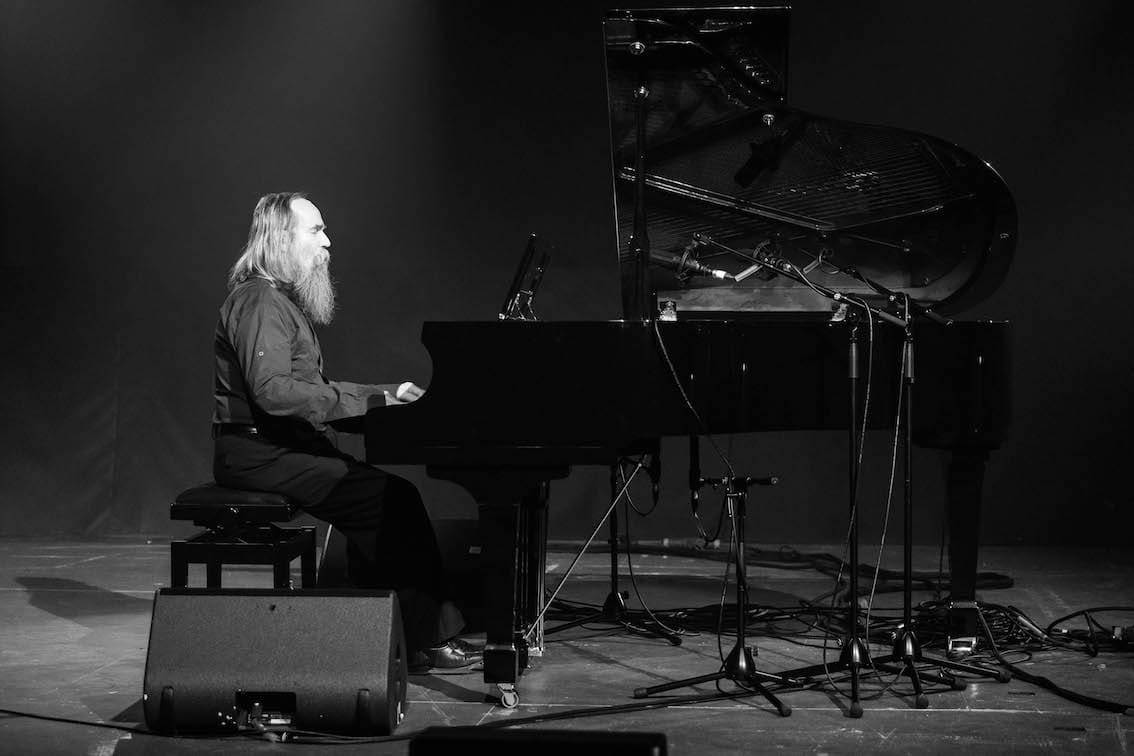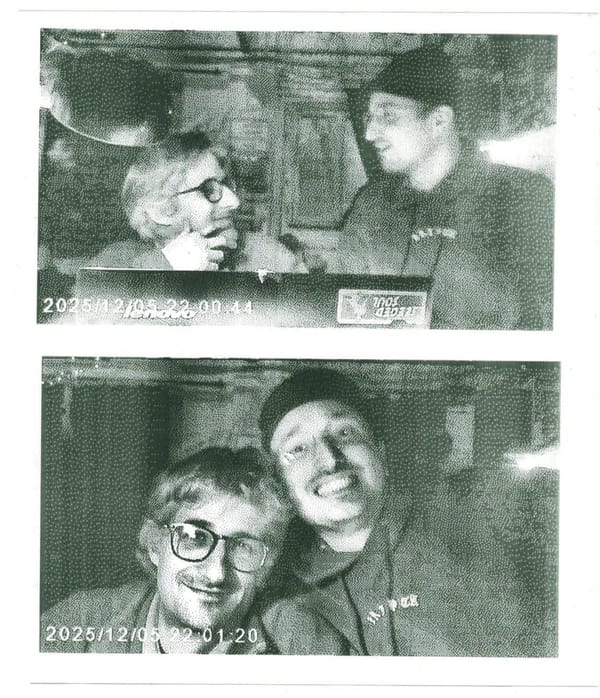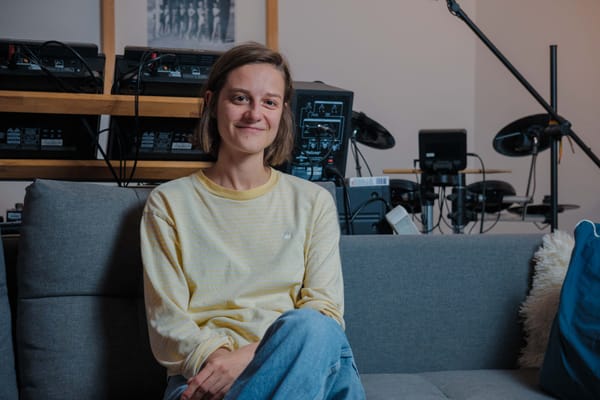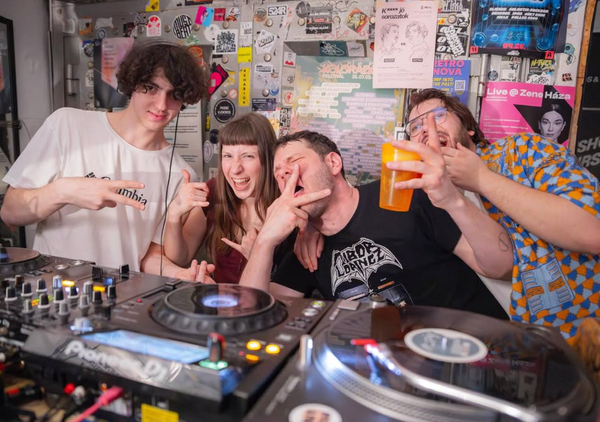Register for free to receive our newsletter, and upgrade if you want to support our work.
„The true purpose of great music, I believe, is not to simply entertain people. It’s to help the soul and mind grow within the individual.“
Lubomyr Melnyk is a true outlier in contemporary music—a pianist whose approach defies convention, both in technique and philosophy. Born in 1948 in Munich to Ukrainian parents, Melnyk developed what he calls Continuous Music, a style that transforms the piano into a vessel of ceaseless motion, where cascading notes dissolve into shimmering overtones and pulsating waves of sound. His compositions are physically demanding, requiring an almost superhuman velocity and precision, but they are never about mere virtuosity. Instead, they evoke a sense of the infinite, where melody and rhythm intertwine in a hypnotic, almost meditative flow.
Continuous Music is not about individual notes but about their collective force—an immersive experience that recalls the kinetic energy of Steve Reich’s phasing patterns or the deep listening ethos of Pauline Oliveros, yet exists in its own orbit. Melnyk’s performances are an act of endurance and devotion, his hands moving at impossible speeds, conjuring a sonic river that sweeps the listener away. He describes the piano not as a percussive instrument but as an extension of the natural world, where sound exists in perpetual movement, like wind through trees or water over rocks.
Though long working in the shadows of the avant-garde, Melnyk has, in recent years, found wider recognition, with releases on Erased Tapes bringing his work to a new generation of listeners attuned to the physicality of sound—whether through club culture, drone, or modern classical explorations. Yet, his mission remains unchanged: to push the piano beyond its traditional role and into a space where music flows like life itself—unbroken, boundless, and eternal.
Lubomyr Melnyk: Hello, Thomas.
Thomas Venker: Hi, Lubomyr. Is this inside your apartment?
Well, it’s a house. And it’s quite wintery here.
Which part of Sweden are we talking about?
The central part, right in the middle—out in the forest. It’s very quiet and peaceful.
I get that. Today’s actually the first warm day here, and I live in a flat in Cologne where we still heat with wood and coal. So I’m celebrating the fact that I don’t have to put wood in the oven today.
Oh, really? I could do that here too, but… it takes so much time. You have to keep feeding it all day long.
But isn’t it difficult to play music when it’s so cold? Sometimes, when my place gets too cold, I even struggle to type my articles.
Well, once the music leads…
You were born in 1948 in Munich to Ukrainian parents. Right now, the world is facing both a brutal war between Russia and Ukraine and a major political shift in Germany, with the far-right AfD likely to secure the second-most votes in the upcoming election.
How do you perceive the state of the world today?
I think the world is in the darkest state I’ve ever seen. And this isn’t just because of the Russian invasion of my country, the destruction of my people, and the devastation of an entire nation. We’re seeing similar things happen everywhere.
What worries me is that people don’t understand the power of the internet and propaganda. All it takes is one person spreading half-truths, lies—just a little distortion—and suddenly, an entire nation’s mindset changes. I believe the Russians have operatives in every country, working for Putin, manipulating information online. They write blogs, post comments, spread disinformation.
The problem, though, is much deeper than just politics. It’s spiritual. Putin, to me, is no longer even a human being. He hasn’t been for 20 years. The signs of something dark—something evil—are evident in him, especially the constant lying. The most obvious sign of evil is the lie. When someone lies all the time, they’ve lost their humanity. They’ve been overtaken by an evil force. No human is clever enough to control the world like Putin does. Only Satan can pull that off.
Putin controls everything now. He controls America through one person—Trump. By controlling Trump, he controls millions. All it takes is to manipulate the right leaders in each country. Step by step, he’s brought the world under his influence. This is far beyond the capacity of any human being—it shows me that Satan is taking over the world. The lack of empathy, the unwillingness to stand up for what’s right, shows the darkness has spread globally.
In Germany, I fear a large portion of the population would rather Putin kill all the Ukrainians if it meant they could return to business as usual. They want their coffee, their cakes, their gasoline—and nothing else seems to matter. This mentality mirrors what’s happening in Trump’s America. Trump created that mentality in the American people—they weren’t like this before. But he’s the one who has shaped them into something else. It’s a terrible threat to the world.
People think Putin only wants to conquer nearby countries, like the Baltics, Poland, or Ukraine. But they fail to understand that someone like Putin won’t stop there. Once he tastes power, there are no more borders. He’ll keep pushing until there’s nothing left. I think many people recognize this, but they keep it at the back of their minds, thinking short-term. They just want peace, silence, a return to normality. But that’s no longer possible.
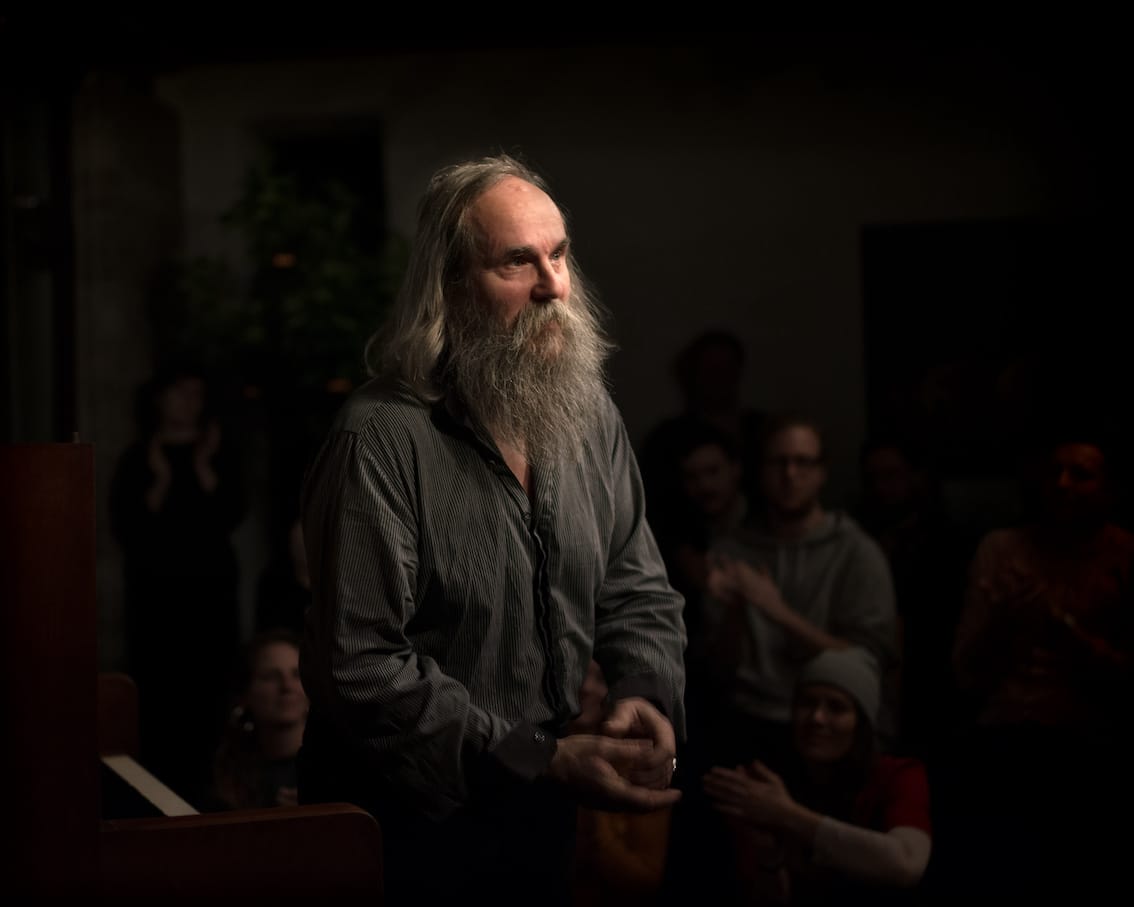
Well, I asked for such a long first answer by the nature of my question.
For a long time, we’ve believed that music is the healing force of the universe—that it has the ability to bring in new waves of energy. As a musician, you’ve always held onto the power of music and performance. But in these times, can music still serve as a force to heal the world, especially in the face of all that’s happening? How do you see your own artistic work in relation to the world today?
It’s not certain that music can stand up against the power of Satan, but we have to try. We, as musicians, must try.
The true purpose of great music, I believe, is not to simply entertain people. It’s to help the soul and mind grow within the individual. Classical music has always done this. You cannot listen to Mozart, Beethoven, Bach, and the like without experiencing intellectual and spiritual growth. In a way, this music serves as a force against evil. Yes, it does. And I will continue to create music that touches people’s hearts, hoping that it will help them grow as human beings.
My goal is first to create beautiful music that has meaning. But I also hope that those who listen to it are changed for the better—that it brings something to their soul, makes them feel better, and perhaps even lights a spark in their lives.
Let’s start on a gentler note. What is the first piano composition you remember hearing?
We had a piano at home, so when I was three years old, I just started playing. And somehow, I could actually create a real piece of music. That was my first experience with the piano. From that moment, my mother realized that I had to pursue it—that this was something important. And over time, it became my whole life.
I grew up surrounded by classical music—only classical music. There was never any rock and roll in our home, not in my life at all, until much, much later.
It’s interesting to think back to the first LP I ever bought. This would have been in the late ’50s or early ’60s. At that time, you couldn’t just order records online, of course—you had to buy them through mail-order catalogs. I remember looking through one of those catalogs and seeing an album of Chopin’s music. I had no idea who Chopin was at the time—I was too young—but something about that album called to me. A voice inside me said, You need to get this album. So I ordered it. It was a collection of Chopin pieces performed by one of the greatest Chopin pianists I’ve ever heard—though she’s almost completely unknown. I can’t recall her last name, but her first name was Lily, and the record was released on Crown Records. Even after all these years—more than 65 now—I can still see the album cover in my mind.
Her performance of Chopin was unlike anything I had ever heard. I was completely swept away. To this day, no one has played Chopin for me the way she did on that album. It’s not that today’s pianists don’t play beautifully—they do, and there’s nothing to complain about. But her playing had something extraordinary about it, something truly special. It felt… heavenly.
Were your parents also musical?
My mother was trained as a contralto and had a very beautiful voice—a classical, operatic kind of training. So I grew up hearing opera arias, the great ones, filling our home. Opera has always been an intense source of marvel and joy for me.
I truly believe that people don’t appreciate it enough. Of course, those who know opera do, but in general, the world tends to lean more toward piano music, cello, violin, concertos, and symphony orchestra performances…
Do you think it also has to do with the spaces where music is experienced? For many people, opera houses—and even classical concert halls—feel so distant from their everyday lives, both physically and culturally. That distance makes it harder for them to connect with the music. In contrast, alternative music and rock and roll became more accessible because the music and the spaces where it was played were much closer to people’s daily experiences. I think that has played a role in shaping how people engage with different kinds of music these days. But let's talk about your actual music.
Let me explain—on stage, it may look like I’m playing the piano, but in reality, it’s my mind that is playing. In Ukraine, many people who come to my concerts are in total shock afterward. They can’t believe a human being is capable of playing this music in such a way—it feels like a technical miracle to them. But in Europe, it’s different. I’ve been performing there for many years, and I can’t recall a single person coming up to me after a concert, truly astonished that this is even possible.
To me, that suggests the music hasn’t really been seen or heard enough for people to stop and think, Wait a minute—how is this even physically possible?
Yeah, but maybe it goes so far beyond the physical that the question doesn’t even need to be asked anymore. Once you experience it in all its beauty, once it truly flows through you, why would you even stop to ask how it happens? You could argue that it becomes something so natural that, at that point, the technical aspect almost fades into the background.
Continuous Music requires a separation between Lubomyr Melnyk, the person, and the ability to play it. It’s not about being a phenomenal pianist in the traditional sense—what’s truly phenomenal is the act of playing Continuous Music itself. It exists in a completely different world from classical piano, both in terms of the instrument and the pianist’s approach. Performing these pieces is radically different from playing concertos or sonatas. And this isn’t just about a mindset—it’s about an entirely distinct physical and technical reality.
Let me draw an analogy from martial arts. A karate master cannot do what a Tai Chi or Kung Fu master does, and vice versa. The techniques—and more importantly, the essence—of each discipline are vastly different. The same applies to my music. Continuous Music is fundamentally separate from conventional piano playing, and I feel this is deeply tied to the piano’s true voice. In fact, this pursuit of the instrument’s voice was what first led me to discover Continuous Music.
For the first time in history, the piano is being heard as it was meant to be. Since Cristofori built the first piano around 1650, technique has remained unchanged. (Lubomyr Melnyk is referring to the Italian instrument maker Bartolomeo Cristofori who is credited with inventing the piano. He originally worked as a harpsichord maker for the Medici family in Florence, and sometime around 1700, he developed the first version of what we now call the piano; remark of the editor).
The same methods used to play Scarlatti (an Italian composer and harpsichordist; a contemporary of J.S. Bach and Handel; remark of the editor) are still used for Beethoven.
But Continuous Music demands a completely different approach. And yet, people don’t seem fully aware of this distinction. Maybe, as you said, it doesn’t need to be spoken—but I still find it strange that, after all these years playing in Europe, no one has ever come up to me after a concert and asked, ‘How is it even possible for your fingers to do this?’
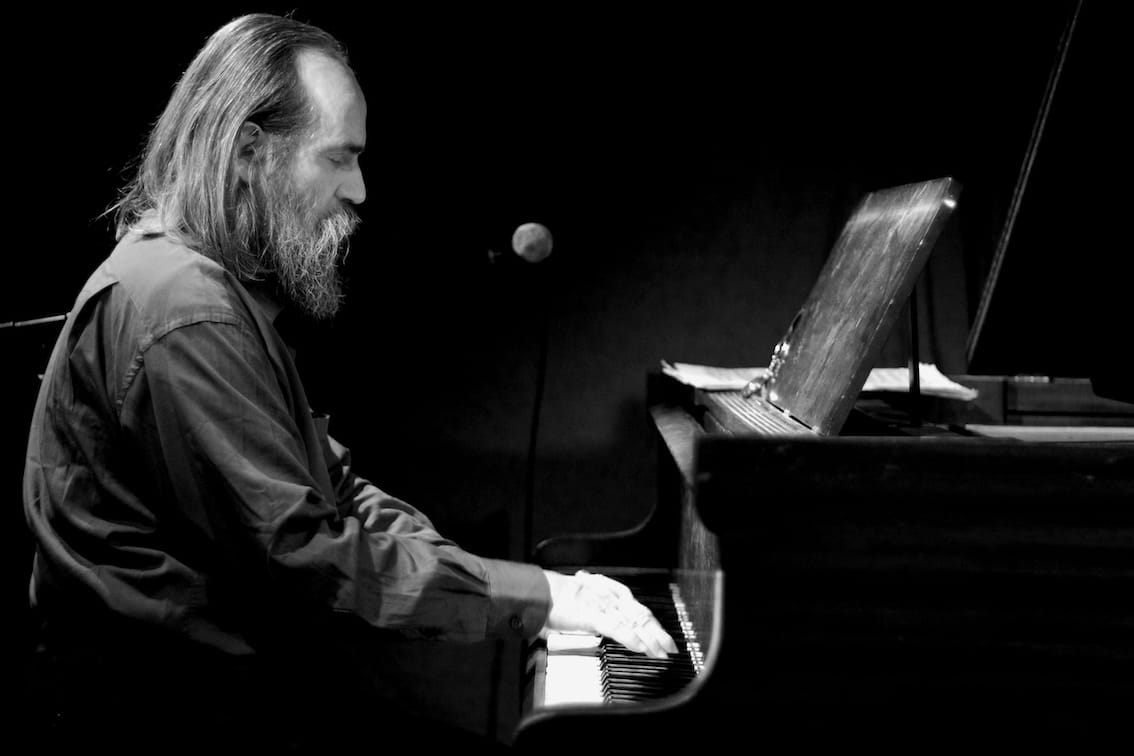
Because they’re too shy to say it. Because they’re fascinated.
And also, when I’m moved by music, why should I talk about technical skills? I’m not a musician, but I love music. I’ve never really understood… why others focus on techniques. They write about the technical aspects of producing music, recording it, and all that. I’ve never been particularly interested in that. For me, it’s the emotions, the world that music creates, and the place it takes me to, which are far more interesting. And so, I would feel like if I went to you, I would be undermining and trivializing it, because you’ve created something so meaningful.
I don’t think it works that way. When you listen to this piano music, you hear something amazing—the incredible sounds that the pianist is pulling from the piano. Those sounds can’t be created by just any pianist. But I think I understand what you’re saying.
You feel they should understand that a higher spirit has to be present for that to happen?
No, the wonderful thing is that the experience—the beauty of this music—wouldn’t be possible without the technique required to bring it to life. But I have a feeling that what you’re saying isn’t quite right. It’s not that they don’t want to talk about it. I think they simply view it as beautiful piano music played by a pianist, right? And they believe that any pianist, if given the score, could perform this music. And think that’s the general idea. But I need to tell people, no—that’s not how it is. No pianist in the world could play these pieces.
I have two questions coming from that. The first may sound weird: Do you ever talk to your piano? Do you have an emotional relationship with pianos?
Well, Thomas, I hate to admit it, but yes, I do. I sometimes speak to the piano when I need something more. A very, very interesting thing happened about a year and a half ago here at home on the piano. I was playing a piece I’m working on—when composing, you tend to sit with a figure for a long time, making it live, listening to it, exploring it—and it was too quiet. So, I said to the piano, “Can you not play louder?” I actually said this out loud. The result was… terrifying. The piano gradually started getting louder and louder, until it was really loud, almost painful to my ears. I looked at my hands, felt them, and thought, “But I’m not playing. I’m not pushing harder. I’m not creating this volume at all. My hands… I don’t even feel them. This is ridiculous. This is impossible.” I became really terrified.
I realized then that the piano is indeed a living being. It can be spoken to, and it deserves respect. At all my concerts, I thank the piano at the end. People might see me sort of touching the piano. I don’t say it out loud, but I am thanking the piano for providing me with the ability to create these sounds and this music.
And the second question: Is it mostly one emotion that you feel when playing the piano? Is the piano your happy place? I would say there’s more to explore than just happiness for you, right?
It varies a great deal. Sometimes there are no emotions at all; it’s just abstract music. And then, of course, when emotions come into it, they take over, and the music becomes a voice for those emotions and thoughts. But this is very normal. I think you can hear in Beethoven’s music (especially the concertos), and in Mozart’s and Bach’s music, they abandon the abstract. Well, it’s not really abstract, but it’s more abstract than emotional. It’s dangerous to say, because really, I think it’s all emotional.
There are extremely high points of emotion in classical music, which are necessary for the music. I guess they are the crowning jewel of the piece when the emotions finally become the dominant element. I don’t think it’s good if a piece is emotional all the time. There needs to be some abstraction; it needs to be a mix. And I strive for that in my own compositions as well—to have that mixture.
I came across an older interview where you reflected on the relationship between mathematics and music—something I completely understand. But that makes me wonder: if music is fundamentally mathematical, does that mean emotions in music are somehow “programmable”? Are they just a numbers game, with notes as numerical positions?
Continuous music really has its origin in the fourth dimension, which is mathematical. I’d say that mathematics has been extremely important—both philosophically and as a part of being human. But mathematics is not enough for music. A composer can’t simply rely on mathematics. However, mathematics can sometimes be a useful tool in the creative process.
People need to return to the ancient Greeks and their concept of mathematics. That was the true thinking—that geometry is part of the foundation of the world. Being both religious and philosophical, I think we must acknowledge mathematics as one of the foundations of our existence and our perception of the world as a physical object. Mathematics defines so much in our lives, but that would be another whole topic.
What I mean with that question is: of course we know, as you said, that there’s a notation of the pieces, but the way you play them makes all the difference. And there are so many components to that—like, for example, being on time, or not being on time, the pressure of playing, and all that. But most of all, I’d be interested in understanding how your own emotional state impacts your performances. If you’re in love, or if you’re going through turbulence in a relationship or friendship while playing, how does that affect your music? Because that has such an impact on what we just described, including the mathematical side, right?
My emotional state has to be put aside when I’m doing a concert. Because I’m playing these pieces and the pieces have their own life. And one has to respect the piece. I can’t allow my own state of emotional happiness or sorrow or exaltation or depression affect that.
But how can you control that?
Well, it’s not hard because the music takes over. When I’m playing the music, I’m playing the music. I’m not expressing, I’m not forcing myself upon the music, I’m letting the music live. And I’m giving my life to the life of the piano. And together we’re creating something.
Now, of course, personal emotional thoughts definitely will come in from time to time while I’m playing. If it suits the music.
The piece is the foremost thing to do. And if in the piece there is somewhere where I can express some emotion that I have, then I will use it.
There’s an artist I deeply love, Paddy McAloon from Prefab Sprout. I don’t know if you’re familiar with him, but it started out as a British pop band before becoming more of a solo project for McAloon, who is a very enigmatic songwriter.
I had prepared a different question, but I couldn’t help thinking of him at this point of our conversation because he has a song called ‘Music Is a Princess’, which captures a lot of what you’ve been talking about the last minutes—the respect for music that you simply can’t argue with.
My original question would have been: There is a song by Prefab Sprout, ‘The King of Rock ‘N’ Roll,’ which has a surreal and playful chorus: ‘Hot dog, jumping frog, Albuquerque.’ It doesn’t make much sense on the surface. So I wonder: If you will ever write lyrics, how would your ideas for lyrics work within a continuous music pattern?
I occasionally do have texts in some of my music.
Oh, sorry, I did not catch those songs yet.
You know, there are real sentences, poetry, and then there are abstract sounds—almost like no language at all. And I… I don’t know. My main voice is through the piano, so writing lyrics has never been a major focus for me. It’s happened occasionally, but the piano music is the core of my life and existence.
It’s quite a challenge to bring people out to live concerts these days. This has become especially difficult after the pandemic, when everything was shut down. Now, it seems people have forgotten how powerful it is to experience live music in person.
For me, as a pianist, the sound of the piano is one of the guiding lights of my music. Recordings can never replicate the same powerful experience that a live concert provides. And hearing a real, living instrument—the piano—is something that people often mention after a concert. They express how happy they are to have heard the piano played live, and how different it is from just listening to recordings.
As you mentioned the pandemic and the changes in people’s attitudes afterwards, do you feel that age influences the way you play your music? Are you ever concerned that there might come a time when you can no longer play the way you want to? Or do you believe, like many musicians we’ve seen, that age doesn’t matter when it comes to performing? We’ve seen musicians struggle with daily life but still be able to perform at their best on stage, as though they’re the same artists they’ve always been. What’s your relationship to that idea?
It’s true, when it comes to playing the piano, one becomes ageless. There’s so much spiritual and mental work happening as you play. So many dimensions flow through you as a musician.
Yes, day-to-day things may become difficult, but when you step onto the stage and begin playing this beautiful instrument and sharing this beautiful music with people, it transforms you. You become ageless. In those moments, the music becomes the central focus, and it’s what truly matters.
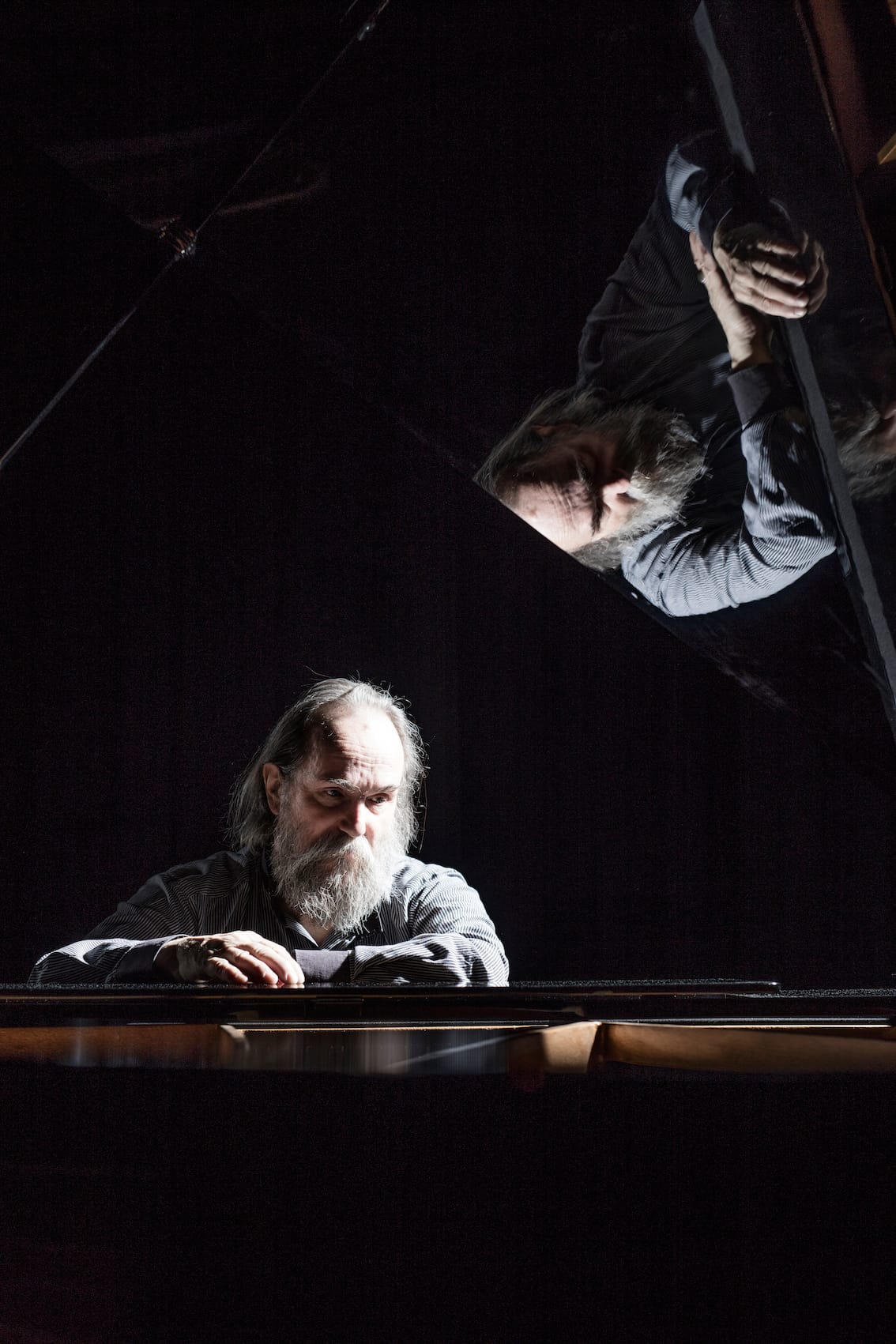
Lubomyr, may I ask, are you a dancer? Do you ever dance to your own music, or to other music? The question comes from my reflection on the relationship between movement and your music.
Well, I feel like I’m a ballet dancer, but on the piano. The keyboard is my floor, and my hands are my legs. The sound that comes from the piano is the result of this dance. A lot of my music, especially early on in my creative life, was deeply influenced by dance. In fact, dance was one of the major elements that helped me discover and create continuous music. It was born out of the inspiration and the need to work with dancers—the spiritual and artistic inspiration they gave me.
For many years—I’d say about 10 years of my composing life—I was closely connected to dance, dancers, choreographers, and dance companies.
So, I guess you could say: I’m a secret dancer.
That’s a beautiful image—a secret dancer. And when it comes to your audience, do you feel… Because a lot of the time, when people think about concerts—and, as we discussed with opera and reception—it’s often about what people think they should be doing in that space.
Do you have expectations about how your audience should experience your music?
Of course, I hope that the people in the audience will love the music they hear—that they will find it beautiful and, more than just beautiful, meaningful. I hope it will bring something valuable into their lives. But that’s not an expectation; it’s more of a hope. And very often, it happens. I’m very grateful to the people for that—for showing enough respect to let the music into their lives and their hearts.
Thomas, I have to really go now.
I understand. One last question. Are you a dreamer? And do you remember your dreams?
Yes. Quite intensely so. In fact, I find that my dreams have become much more realistic, more like reality, than they were in the past. You know, dreams used to be quite crazy, but now they feel almost like real life. They’re very slow and extremely logical. It’s funny because, in my dreams, everything flows normally, just as it does in real life. So yes, I am definitely a dreamer.
Thank you, Lubomyr for this conversation.
This article is brought to you by Kaput Mag as part of the EM GUIDE project – an initiative dedicated to empowering independent music magazines and strengthen the underground music scene in Europe. Read more about the project at emgui.de.
Funded by the European Union. Views and opinions expressed are, however, those of the author(s) only and do not necessarily reflect those of the European Union (EU) or the European Education and Culture Executive Agency (EACEA). Neither the EU nor EACEA can be held responsible for them.


